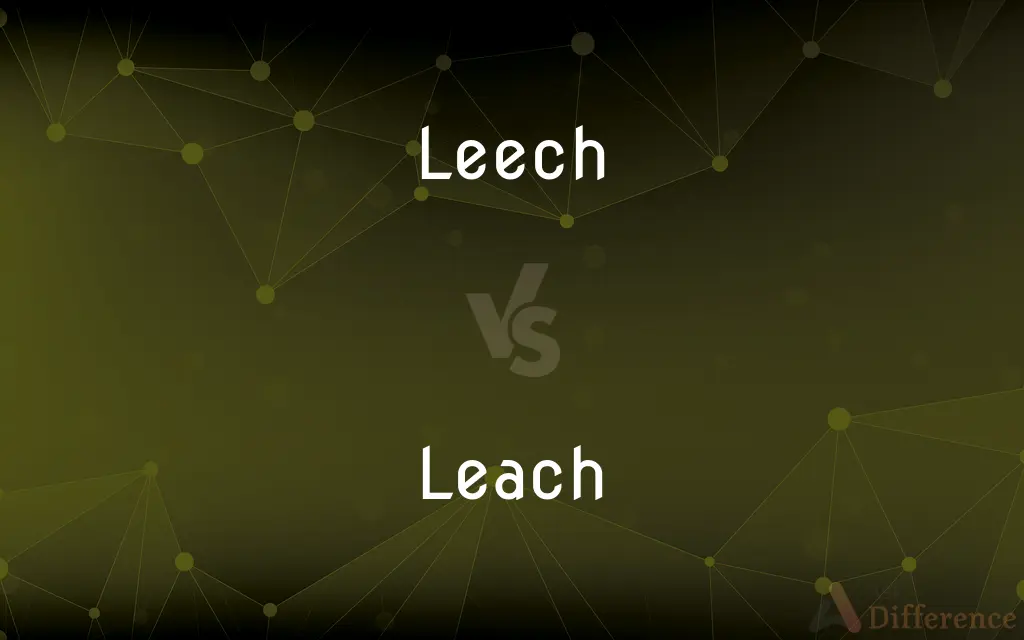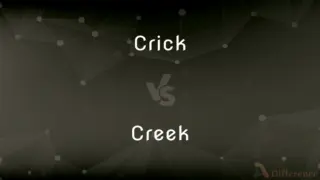Leech vs. Leach — What's the Difference?
Edited by Tayyaba Rehman — By Fiza Rafique — Updated on April 26, 2024
A leech is a bloodsucking worm used medically for its anticoagulant properties, whereas to leach means to dissolve or carry away substances by a solvent, often used in the context of soil or chemicals.

Difference Between Leech and Leach
Table of Contents
ADVERTISEMENT
Key Differences
Leeches are parasitic or predatory worms, part of the annelid family, known for feeding on the blood of humans and other animals. They are sometimes used in medicine to improve blood circulation and reduce swelling. On the other hand, leaching is a process where solids are dissolved or carried away from a substance by a liquid, commonly used in environmental science and chemistry to describe the movement of soluble chemicals through soil or other media.
While leeches physically attach to their hosts to extract blood, the process of leaching involves the passage of a solvent through a permeable material, extracting soluble constituents. For example, rainwater may leach nutrients from the soil, depleting its fertility.
The medical use of leeches is a controlled and deliberate application based on centuries of practice, particularly effective in reconstructive surgery to relieve venous congestion. In contrast, leaching is often an undesirable environmental effect, leading to nutrient loss in soil or the contamination of water sources by soluble toxins.
The term "leech" has also metaphorically come to describe a person who exploits others, deriving benefit at their expense without giving anything in return. Leach, however, does not have a metaphorical meaning but is strictly a scientific term.
From an etymological perspective, "leech" comes from Old English "lǣce," meaning healer, a nod to its medical utility, while "leach" is derived from Old English "leccan," meaning to moisten or to allow liquid to pass through.
ADVERTISEMENT
Comparison Chart
Definition
A parasitic worm used medically for bloodsucking
A process of dissolving or carrying away substances by a solvent
Usage Context
Medical, ecological, vernacular
Environmental science, chemistry
Nature
Biological entity
Chemical process
Application
Blood extraction, medical therapies
Soil treatment, environmental monitoring
Connotation
Can be negative when used metaphorically
Generally neutral, technical term
Compare with Definitions
Leech
A bloodsucking annelid worm, often used in medical treatments.
The surgeon applied leeches to the patient’s skin to reduce blood clotting.
Leach
The act of removing particles from a material.
Acids leach aluminum from the topsoil, affecting plant health.
Leech
A creature that attaches to another living being and feeds on it.
Leeches are common in stagnant waters, clinging to unsuspecting swimmers.
Leach
The process by which a substance is washed out or dissolved.
Leach fields are used in septic systems to manage waste water.
Leech
A person who clings to another for personal gain.
He was considered a leech, always taking from friends but never giving back.
Leach
To dissolve out soluble constituents from ashes, soil, etc., by percolation.
Contaminants leach into the groundwater from the waste dump.
Leech
To cling or adhere closely.
The image of the leech seemed to leech onto his thoughts, refusing to let go.
Leach
To cause (liquid) to pass through a porous substance or small holes; filter.
Water leaches essential nutrients from the organic soil.
Leech
Used metaphorically to describe exploitation.
As a leech drains blood, so he drained his family's finances.
Leach
Extraction of certain materials by the action of a fluid.
The plant roots help to prevent the leach of minerals during heavy rains.
Leech
Leeches are segmented parasitic or predatory worms that comprise the subclass Hirudinea within the phylum Annelida. They are closely related to the oligochaetes, which include the earthworm, and like them have soft, muscular, segmented bodies that can lengthen and contract.
Leach
To remove soluble or other constituents from by the action of a percolating liquid
Heavy rains that leached the soil of minerals.
Leech
Any of various chiefly aquatic carnivorous or bloodsucking annelid worms of the class (or subclass) Hirudinea, of which one species (Hirudo medicinalis) was formerly widely used by physicians for therapeutic bloodletting.
Leach
To remove from a substance by the action of a percolating liquid
Acids in groundwater that leach calcium out of the bedrock.
Leech
One that preys on or clings to another; a parasite.
Leach
To empty; drain
"a world leached of pleasure, voided of meaning" (Marilynne Robinson).
Leech
(Archaic) A physician.
Leach
To be dissolved or passed out by a percolating liquid.
Leech
Either vertical edge of a square sail.
Leach
The act or process of leaching.
Leech
The after edge of a fore-and-aft sail.
Leach
A porous, perforated, or sievelike vessel that holds material to be leached.
Leech
To bleed with leeches.
Leach
The substance through which a liquid is leached.
Leech
To drain the essence or exhaust the resources of.
Leach
A quantity of wood ashes, through which water passes, and thus imbibes the alkali.
Leech
To attach oneself to another in the manner of a leech.
Leach
A tub or vat for leaching ashes, bark, etc.
Leech
An aquatic blood-sucking annelid of class Hirudinea, especially Hirudo medicinalis.
Leach
(nautical) leech.
Leech
(figuratively) A person who derives profit from others in a parasitic fashion.
Leach
A jelly-like sweetmeat popular in the fifteenth century.
Leech
A glass tube designed for drawing blood from damaged tissue by means of a vacuum.
Leach
(transitive) To purge a soluble matter out of something by the action of a percolating fluid.
Heavy rainfall can leach out minerals important for plant growth from the soil.
Leech
(archaic) A physician.
Leach
(intransitive) To part with soluble constituents by percolation.
The gangue was leached to recover minerals left behind by the original technology.
Leech
(Germanic paganism) A healer.
Leach
See 3d Leech.
Leech
(nautical) The vertical edge of a square sail.
Leach
A quantity of wood ashes, through which water passes, and thus imbibes the alkali.
Leech
(nautical) The aft edge of a triangular sail.
Leach
A tub or vat for leaching ashes, bark, etc.
Leech
To apply a leech medicinally, so that it sucks blood from the patient.
Leach
See Leech, a physician.
Leech
To drain (resources) without giving back.
Bert leeched hundreds of files from the BBS, but never uploaded anything in return.
Leach
To remove the soluble constituents from by subjecting to the action of percolating water or other liquid; as, to leach ashes or coffee.
Leech
To treat, cure or heal.
Leach
To dissolve out; - often used with out; as, to leach out alkali from ashes.
Leech
See 2d Leach.
Leach
To part with soluble constituents by percolation.
Leech
The border or edge at the side of a sail.
Leach
The process of leaching
Leech
A physician or surgeon; a professor of the art of healing.
Leech, heal thyself.
Leach
Cause (a liquid) to leach or percolate
Leech
Any one of numerous genera and species of annulose worms, belonging to the order Hirudinea, or Bdelloidea, esp. those species used in medicine, as Hirudo medicinalis of Europe, and allied species.
Leach
Permeate or penetrate gradually;
The fertilizer leached into the ground
Leech
A glass tube of peculiar construction, adapted for drawing blood from a scarified part by means of a vacuum.
Leach
Remove substances from by a percolating liquid;
Leach the soil
Leech
To treat as a surgeon; to doctor; as, to leech wounds.
Leech
To bleed by the use of leeches.
Leech
Carnivorous or bloodsucking aquatic or terrestrial worms typically having a sucker at each end
Leech
A follower who hangs around a host (without benefit to the host) in hope of gain or advantage
Leech
Draw blood;
In the old days, doctors routinely bled patients as part of the treatment
Common Curiosities
How does one prevent unwanted leaching?
Proper waste disposal, using liners in landfills, and managing agricultural practices can help reduce unwanted leaching.
Can leeches be beneficial in any way?
Yes, leeches have medical applications, particularly in promoting blood circulation and preventing clotting in surgery.
What are common problems caused by leaching in the environment?
Leaching can lead to soil nutrient depletion and water pollution.
What is the main difference between a leech and leaching?
A leech is an organism that sucks blood, while leaching is a process where substances are dissolved or carried away by a liquid.
Where are leeches commonly found?
Leeches are commonly found in freshwater environments like ponds and marshes.
How do leeches feed?
Leeches attach to their host and use an anticoagulant in their saliva to feed on blood without causing blood clotting.
What are alternative medical uses for leeches?
Besides bloodletting, leeches are used in therapies to relieve pressure and enhance healing in reattached fingers and toes.
Is leaching reversible?
While the process itself isn’t easily reversible, steps can be taken to restore leached soils with nutrients.
Is leaching always a harmful process?
Not necessarily; it is also a natural and essential process in ecosystems, although it can be harmful in polluted environments.
What materials are most susceptible to leaching?
Soils, especially those that are loose and sandy, and waste materials are highly susceptible to leaching.
Can the term leech have positive connotations?
While typically negative, in medical contexts, the term is positive, referring to beneficial treatments.
What is a leach field?
A leach field is an area of land used to filter and disperse the effluent from a septic system.
Are there any controls or treatments for leaching?
Yes, using barriers or chemical adjustments can control or reduce leaching in agricultural and waste management settings.
Can leaching occur in everyday items?
Yes, substances like plastics and ceramics can leach chemicals into food and drinks under certain conditions.
How do leeches benefit ecosystems?
Leeches play a role in the food chain, serving as food for various birds and fishes, and help control certain aquatic populations.
Share Your Discovery

Previous Comparison
Crick vs. Creek
Next Comparison
Cod vs. ScrodAuthor Spotlight
Written by
Fiza RafiqueFiza Rafique is a skilled content writer at AskDifference.com, where she meticulously refines and enhances written pieces. Drawing from her vast editorial expertise, Fiza ensures clarity, accuracy, and precision in every article. Passionate about language, she continually seeks to elevate the quality of content for readers worldwide.
Edited by
Tayyaba RehmanTayyaba Rehman is a distinguished writer, currently serving as a primary contributor to askdifference.com. As a researcher in semantics and etymology, Tayyaba's passion for the complexity of languages and their distinctions has found a perfect home on the platform. Tayyaba delves into the intricacies of language, distinguishing between commonly confused words and phrases, thereby providing clarity for readers worldwide.
















































